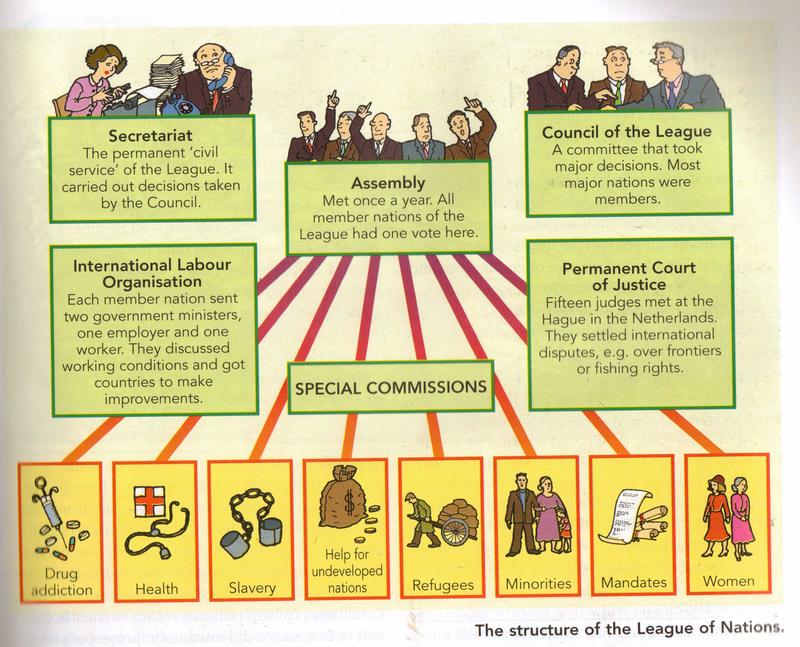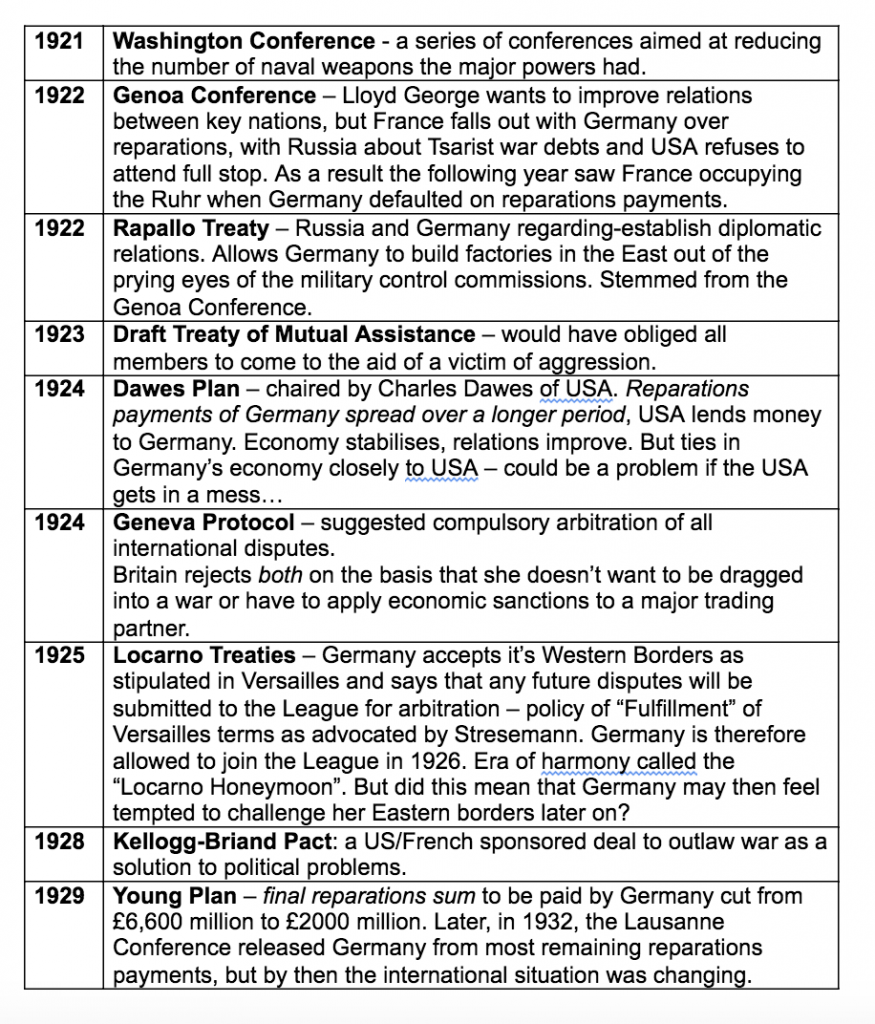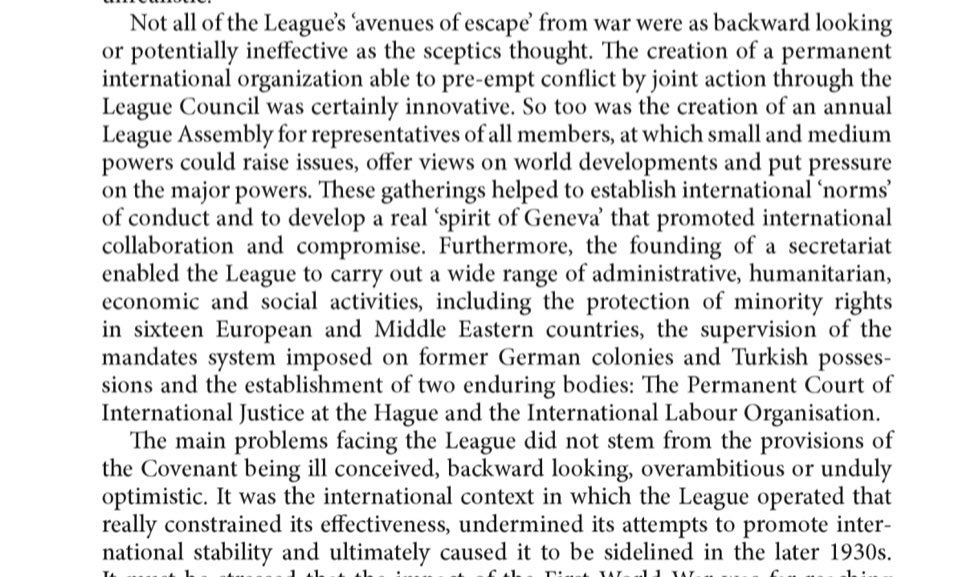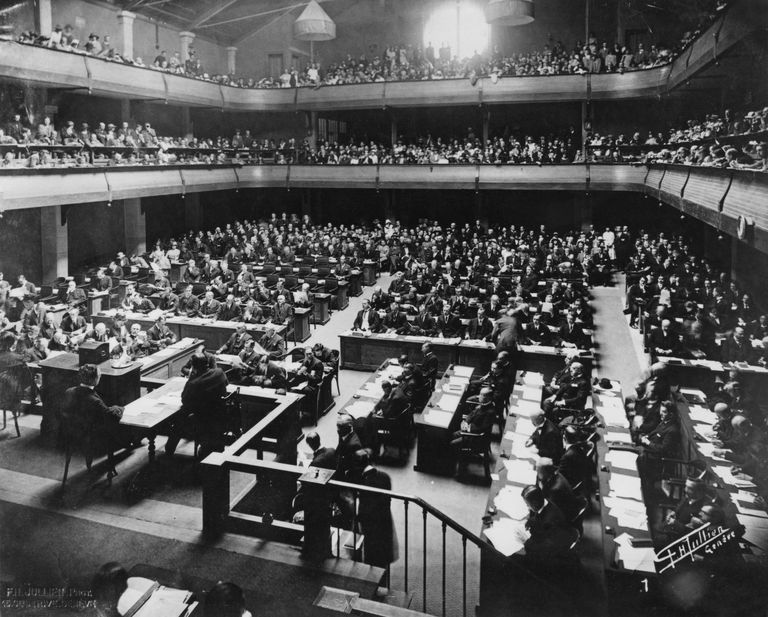- Powers of the League
- The treaties and agreements of the 1920s
- Corfu, 1923
- Collective Security
- Perspectives
What were the powers of the League?

A summary
This presentation gives a brief summary of the League powers.
The treaties and agreements of the 1920s
Watch the video above and evaluate the League’s successes during the 1920s. This is useful for analysing the consequences of the First World War.

The League of Nations undoubtedly had successes in the 1920s. Emotion (because of the First World War) may have been a factor in what the politicians and people strived to achieve during this decade.
Corfu, 1923
From ‘Consistently with Honour’: Great Britain, the League of Nations and the Corfu Crisis of 1923. Peter J. Yearwood.
- Italian General Tellini was murdered on the Greek island of Corfu. It proved to be the first major test for the League of Nations and one that many believe, then and afterwards, it failed. Tellini was the representative of the Council of Ambassadors, a replacement body of the Entente powers from the First World War. It became part of the League of Nations in the 1920s and played a significant role in the Corfu Crisis.
- The issue was over Italian leader Mussolini’s aggressive reaction to the murder. He gave Greece a 24-hour ultimatum, which was unacceptable, and proceeded to bomb the island before occupying it. How should the League deal with this aggression?
- The British government was outraged at Mussolini and members said that the violence was inexcusable. But it felt that maintaining the reputation of the League was the priority, “The essential need was convincingly to reassert the principles of decent international behaviour and respect for law.” (Foreign Office).
- There were three constraints to the British government: Mussolini may become more aggressive if punished, the League machinery allowed for a veto so Ital y and possibly France could prevent any action, and France did not want Mussolini’s aggression to go unpunished but also did not want the Italian leader to be humiliaited. This made agreement with the British government more difficult and make the League look disunited. Furthermore, no British politician could opt to support the League over relations with France.
- Sanctions and force were suggested but these presented huge problems too. The former would not work without the US, who was not a member of the League, and force would mean the Royal Navy being sent to the Meditarranean and war declared. Both were unpopular.
- It was decided that as long as Mussolini left Corfu and Greece pay reparations for the murder (50 million lire of 50 000 pounds), the League would be content. However, this was a Council of Ambassadors demand, not through the League as such…so it could undermine the organisation.
- However, if Mussolini turned this down, the issue was to go to the League Assembly. This would probably lead to all the members denouncing Italy; there is little doubt Mussolini was aware of this and supported the Council demand instead. As a result, it was seen that the court of public opinion was a useful tool to threaten an aggressor.
- The League members were happy with the result and praised the British members for their actions in preserving peace and guaranteeing the prestige of the League.
- But there were criticisms of the deal, especially from the British government. Harold Nicholson, a member of the British Foreign Office at the time, wrote that “the League of Nations had suffered a defeat from which its prestige has never recovered.”
- “Peace had been preserved, but almost, it seemed, despite the League rather than because of it. The sanctions articles of the covenant had been shown to be ineffective, at least when agreement between France and Great Britain were lacking. On the other hand, public opinion as manifested in the assembly had been shown to be a powerful weapon, but only as long as it was not actually used.” (Yearwood)
Collective Security
from ‘The Failure of Collective Security in the Post World Wars I and II International System’ by Joseph C. Ebegbulem
- Collective Security (CS) meant that any aggression by one state would bring a response from all states.
- The principles of CS involves a willingness to apply sanctions as and when necessary and even to go to war. CS will never work unless all nations that take part are willing to either threaten sanctions or even war.
- CS based on four principles: states cannot use force unless for self-defence, an attack on one is an attack on all, all nations promise to halt aggression, and finally all to help with the supply of materiel and/or personnel resources.
Problems with Collective Security
- Arguably, it was idealistic because it made states ignore their own self-interest.
- Also, using military action as a key tool may prevent the use of other diplomacy.
- There is no common vital interest. Why should Paraguay help Malaysia for example?
- Nations may feel that any action is too risky.
- Powerful nations will have more influence on the veto.
- There is likely to be divided loyalties. Does a state choose to support the League or another nation instead?
- The USA was not a member of the League, its economic leverage would have been important to the imposition of sanctions.
- For both the Manchurian and Abyssinian crises, the League did not act as it should because of the two leading powers had their own agendas.
- Countries unwilling to give up their sovereignty.
- The League, arguably the UN too, has too much of a European influence. Nations from around the world did not trust the League as a result.
Perspectives
- The first two historians are generally positive about the League of Nations, they argue that they started the process of international cooperation and collaboration to keep and maintain the peace of the world.
- E.H. Carr is a useful counter to these views, arguing that the League was flawed at the outset.
Ruth Henig
Ruth Henig explains the League’s Council and Assembly helped establish international norms of conduct between countries of all sizes. A Spirit of Geneva promoted international collaboration and compromise, and there were many successes as a result. The organisation of the League was not what led to its failure, rather it was the international context which undermined it – she blames the Versailles Treaty for this. Moreover, she argues ‘It is undoubtedly the case that expectations of what the League might be able to achieve were too high.’
History Today – The League of Nations Met for the Last Time, by Ruth Henig
Frank McDonough

- Historians were more positive about the League in the 1920s and early 1930s.
- E.H. Carr, the well-respected British historian, in 1939 argued that the very idea of an international body to maintain peace was flawed.

- However, this view was not supported at the time by academic peers.

